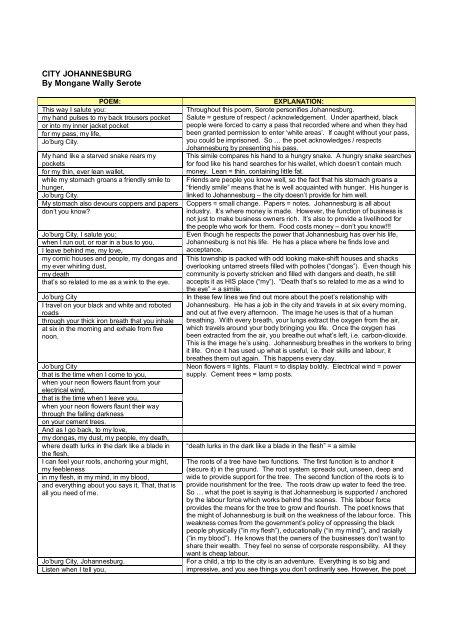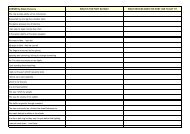Poetry Notes - Mrs-claassen.co.za
Poetry Notes - Mrs-claassen.co.za
Poetry Notes - Mrs-claassen.co.za
Create successful ePaper yourself
Turn your PDF publications into a flip-book with our unique Google optimized e-Paper software.
CITY JOHANNESBURG<br />
By Mongane Wally Serote<br />
POEM: EXPLANATION:<br />
This way I salute you: Throughout this poem, Serote personifies Johannesburg.<br />
my hand pulses to my back trousers pocket Salute = gesture of respect / acknowledgement. Under apartheid, black<br />
or into my inner jacket pocket<br />
people were forced to carry a pass that re<strong>co</strong>rded where and when they had<br />
for my pass, my life,<br />
been granted permission to enter ‘white areas’. If caught without your pass,<br />
Jo’burg City.<br />
you <strong>co</strong>uld be imprisoned. So … the poet acknowledges / respects<br />
Johannesburg by presenting his pass.<br />
My hand like a starved snake rears my This simile <strong>co</strong>mpares his hand to a hungry snake. A hungry snake searches<br />
pockets<br />
for food like his hand searches for his wallet, which doesn’t <strong>co</strong>ntain much<br />
for my thin, ever lean wallet,<br />
money. Lean = thin, <strong>co</strong>ntaining little fat.<br />
while my stomach groans a friendly smile to Friends are people you know well, so the fact that his stomach groans a<br />
hunger,<br />
“friendly smile” means that he is well acquainted with hunger. His hunger is<br />
Jo’burg City.<br />
linked to Johannesburg – the city doesn’t provide for him well.<br />
My stomach also devours <strong>co</strong>ppers and papers Coppers = small change. Papers = notes. Johannesburg is all about<br />
don’t you know?<br />
industry. It’s where money is made. However, the function of business is<br />
not just to make business owners rich. It’s also to provide a livelihood for<br />
the people who work for them. Food <strong>co</strong>sts money – don’t you know!!!<br />
Jo’burg City, I salute you; Even though he respects the power that Johannesburg has over his life,<br />
when I run out, or roar in a bus to you, Johannesburg is not his life. He has a place where he finds love and<br />
I leave behind me, my love,<br />
acceptance.<br />
my <strong>co</strong>mic houses and people, my dongas and This township is packed with odd looking make-shift houses and shacks<br />
my ever whirling dust,<br />
overlooking untarred streets filled with potholes (“dongas”). Even though his<br />
my death<br />
<strong>co</strong>mmunity is poverty stricken and filled with dangers and death, he still<br />
that’s so related to me as a wink to the eye. accepts it as HIS place (“my”). “Death that’s so related to me as a wind to<br />
the eye” = a simile.<br />
Jo’burg City In these few lines we find out more about the poet’s relationship with<br />
I travel on your black and white and roboted Johannesburg. He has a job in the city and travels in at six every morning,<br />
roads<br />
and out at five every afternoon. The image he uses is that of a human<br />
through your thick iron breath that you inhale breathing. With every breath, your lungs extract the oxygen from the air,<br />
at six in the morning and exhale from five which travels around your body bringing you life. Once the oxygen has<br />
noon.<br />
been extracted from the air, you breathe out what’s left, i.e. carbon-dioxide.<br />
This is the image he’s using. Johannesburg breathes in the workers to bring<br />
it life. Once it has used up what is useful, i.e. their skills and labour, it<br />
breathes them out again. This happens every day.<br />
Jo’burg City Neon flowers = lights. Flaunt = to display boldly. Electrical wind = power<br />
that is the time when I <strong>co</strong>me to you,<br />
when your neon flowers flaunt from your<br />
electrical wind,<br />
that is the time when I leave you,<br />
when your neon flowers flaunt their way<br />
through the falling darkness<br />
on your cement trees.<br />
And as I go back, to my love,<br />
my dongas, my dust, my people, my death,<br />
supply. Cement trees = lamp posts.<br />
where death lurks in the dark like a blade in<br />
the flesh,<br />
“death lurks in the dark like a blade in the flesh” = a simile<br />
I can feel your roots, anchoring your might, The roots of a tree have two functions. The first function is to anchor it<br />
my feebleness<br />
(secure it) in the ground. The root system spreads out, unseen, deep and<br />
in my flesh, in my mind, in my blood,<br />
wide to provide support for the tree. The se<strong>co</strong>nd function of the roots is to<br />
and everything about you says it, That, that is provide nourishment for the tree. The roots draw up water to feed the tree.<br />
all you need of me.<br />
So … what the poet is saying is that Johannesburg is supported / anchored<br />
by the labour force which works behind the scenes. This labour force<br />
provides the means for the tree to grow and flourish. The poet knows that<br />
the might of Johannesburg is built on the weakness of the labour force. This<br />
weakness <strong>co</strong>mes from the government’s policy of oppressing the black<br />
people physically (“in my flesh”), educationally (“in my mind”), and racially<br />
(“in my blood”). He knows that the owners of the businesses don’t want to<br />
share their wealth. They feel no sense of <strong>co</strong>rporate responsibility. All they<br />
want is cheap labour.<br />
Jo’burg City, Johannesburg. For a child, a trip to the city is an adventure. Everything is so big and<br />
Listen when I tell you,<br />
impressive, and you see things you don’t ordinarily see. However, the poet



